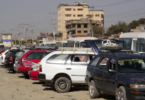KABUL (Khaama Press): Rina Amiri, the US Special Envoy for Afghanistan’s Women, citing the human and material losses from recent floods in several provinces, has called on the Taliban to lift the “paralyzing” restrictions on women and girls to combat the damages caused by climate change.
Amiri wrote on her social media platform X, that the Taliban should utilize the capabilities of all Afghan people to address the damages caused by climate change.
She has expressed sympathy with the victims and those affected by the recent floods in Afghanistan.
Aid organizations, upon which the lives of millions of citizens have depended since the Taliban’s takeover, have repeatedly stated that the Taliban’s restrictions against women are a barrier to providing assistance to the people.
In some cases, these organizations have been forced to suspend their activities due to the Taliban’s restrictions.
Recent floods in the provinces of Badakhshan, Ghor, Sar-e Pul, Herat, Baghlan, Faryab, Takhar, Kunduz, Jowzjan, Kandahar, and other provinces have caused significant human and material losses.
This comes amid a dire humanitarian crisis, which the recent floods further exacerbate the situation.
Some residents of the flood-affected areas said that several days have passed without receiving any assistance from the Taliban government or aid agencies.
To date, the Taliban have not released a comprehensive report detailing the full extent of casualties and damages resulting from the recent floods. However, a spokesperson from the Ministry of Interior within the group has confirmed significant losses in Baghlan province alone, where at least 50 individuals have lost their lives and more than 100 others have sustained injuries.
The lack of detailed information and the emerging numbers from Baghlan underscore the severe impact of the natural disaster on the region. The reported figures highlight the urgent need for more transparent reporting and effective disaster response measures to address the ongoing crisis and prevent further loss of life and injury.







